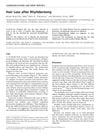 10 citations,
January 2014 in “Endocrinology & metabolic syndrome”
10 citations,
January 2014 in “Endocrinology & metabolic syndrome” PCOS is a long-term condition that needs more research for better understanding and treatment.
8 citations,
September 1993 in “Human psychopharmacology” Some antidepressants can cause rare hair loss, which can significantly affect patients' well-being.
 7 citations,
June 2015 in “Journal of The American Academy of Dermatology”
7 citations,
June 2015 in “Journal of The American Academy of Dermatology” Finasteride helps treat frontal fibrosing alopecia, improving or stabilizing the condition in many patients.
 7 citations,
April 1987 in “International Journal of Dermatology”
7 citations,
April 1987 in “International Journal of Dermatology” Stopping imipramine reduced the woman's hair loss.
 6 citations,
May 2017 in “InTech eBooks”
6 citations,
May 2017 in “InTech eBooks” Hair loss can cause serious mental health problems and treating it requires a team of experts.
 6 citations,
May 2014 in “Biomarkers and Genomic Medicine”
6 citations,
May 2014 in “Biomarkers and Genomic Medicine” Charnoly bodies could be a marker for cell damage, and certain nutrients and proteins might prevent them, potentially helping with brain diseases and cancer.
 6 citations,
June 2004 in “Dermatologic Surgery”
6 citations,
June 2004 in “Dermatologic Surgery” A woman had temporary hair loss after a facelift, which improved on its own within a year.
 5 citations,
February 2023 in “European journal of endocrinology”
5 citations,
February 2023 in “European journal of endocrinology” Older patients with Cushing's syndrome often have different symptoms and treatment outcomes compared to younger patients.
 5 citations,
January 2023 in “Fertility and sterility”
5 citations,
January 2023 in “Fertility and sterility” Doctors are preparing to potentially perform uterus transplants in transgender women, considering technical, hormonal, and ethical factors.
 5 citations,
December 2022 in “Toxins”
5 citations,
December 2022 in “Toxins” Neurotoxins can affect neurotransmitter release and have potential in treating muscle, pain, and cancer conditions, but more research is needed on how they work.
 5 citations,
November 2021 in “Skin appendage disorders”
5 citations,
November 2021 in “Skin appendage disorders” Hair loss can cause stress and mental health issues, so treatments should address both the physical and psychological aspects, involving a team of dermatologists, psychologists, and hair specialists.
 5 citations,
October 2020 in “Brain Research Bulletin”
5 citations,
October 2020 in “Brain Research Bulletin” Etifoxine, an anxiety drug, can lessen brain inflammation and cognitive issues in mice, partly by increasing production of protective brain steroids.
 5 citations,
January 2014 in “BioMed Research International”
5 citations,
January 2014 in “BioMed Research International” Hormonal status significantly affects women's skin health throughout their lives.
 4 citations,
August 2021 in “Clinical and Experimental Reproductive Medicine”
4 citations,
August 2021 in “Clinical and Experimental Reproductive Medicine” The 2018 guideline for PCOS suggests new diagnostic criteria and treatments, but recognizes the need for more research.
4 citations,
April 2020 in “Reports of Practical Oncology & Radiotherapy” Prostate cancer patients need early psychological and sexual support during radiotherapy to improve their quality of life.
 4 citations,
January 2019 in “Clinical and Experimental Dermatology”
4 citations,
January 2019 in “Clinical and Experimental Dermatology” The review found that individualized treatment and teamwork are important for trichotillomania, and patients who followed through with treatment often improved.
 3 citations,
May 2011 in “Medical Hypotheses”
3 citations,
May 2011 in “Medical Hypotheses” Transnasal cooling could reveal new insights into various physiological conditions and may be a natural way to transfer heat from the brain.
 2 citations,
October 2022 in “Frontiers in genetics”
2 citations,
October 2022 in “Frontiers in genetics” Late diagnosis of congenital adrenal hyperplasia can greatly affect physical development, gender identity, and sexual health.
2 citations,
October 2019 in “Nanomedicine” Pharmaceutical care in transplantation faces challenges but has promising future opportunities for better outcomes.
 2 citations,
January 2019 in “International Journal of Medicine in Developing Countries”
2 citations,
January 2019 in “International Journal of Medicine in Developing Countries” Telogen Effluvium is a common hair loss condition, particularly in women, with no specific FDA-approved treatment, and recovery can take up to 18 months.
2 citations,
February 2016 in “Irish journal of psychological medicine” Mirtazapine may cause hair loss and change hair color, but stopping the drug can reverse these effects.
 2 citations,
February 2014 in “Journal of the European Academy of Dermatology and Venereology”
2 citations,
February 2014 in “Journal of the European Academy of Dermatology and Venereology” High levels of prolactin in the blood can be linked to widespread hair loss.
 1 citations,
June 2023 in “Pharmacognosy Research”
1 citations,
June 2023 in “Pharmacognosy Research” Bacopa monnieri, or Brahmi, is a traditional herb that may improve memory and treat various conditions, but more research is needed.

A functional medicine approach may help long COVID patients by focusing on adrenal fatigue, gut health, and vitamin D deficiency, using diagnostic tools and lifestyle changes.
 1 citations,
May 2023 in “Scientific Reports”
1 citations,
May 2023 in “Scientific Reports” Most hospitalized COVID-19 survivors in the study experienced long-term symptoms, affecting their daily life and mental functions.
 1 citations,
March 2023 in “Nutrients”
1 citations,
March 2023 in “Nutrients” The conclusion is that obesity should be managed with a slow, balanced approach to diet and exercise, with medication and surgery as additional options, and education and access to care are important.
 1 citations,
March 2023 in “Clinical, Cosmetic and Investigational Dermatology”
1 citations,
March 2023 in “Clinical, Cosmetic and Investigational Dermatology” Current treatments for Alopecia Areata have mixed success, and there's a need for better, more accessible options and support for affected individuals.
 1 citations,
February 2023 in “Daehan ui'sa hyeobhoeji/Daehan uisa hyeopoeji”
1 citations,
February 2023 in “Daehan ui'sa hyeobhoeji/Daehan uisa hyeopoeji” Primary healthcare clinics are key in managing chemotherapy side effects using various medications and treatments.
 1 citations,
January 2023 in “Revista da Associação Médica Brasileira”
1 citations,
January 2023 in “Revista da Associação Médica Brasileira” Experts agree on the need for standardized definitions and education for post-COVID-19 conditions.
 1 citations,
April 2022 in “Annals Academy of Medicine Singapore”
1 citations,
April 2022 in “Annals Academy of Medicine Singapore” PCOS care in Singapore can be bettered by refining referral systems, standardizing diagnosis and treatment, enhancing complication screening, and offering educational resources for clinicians.


























